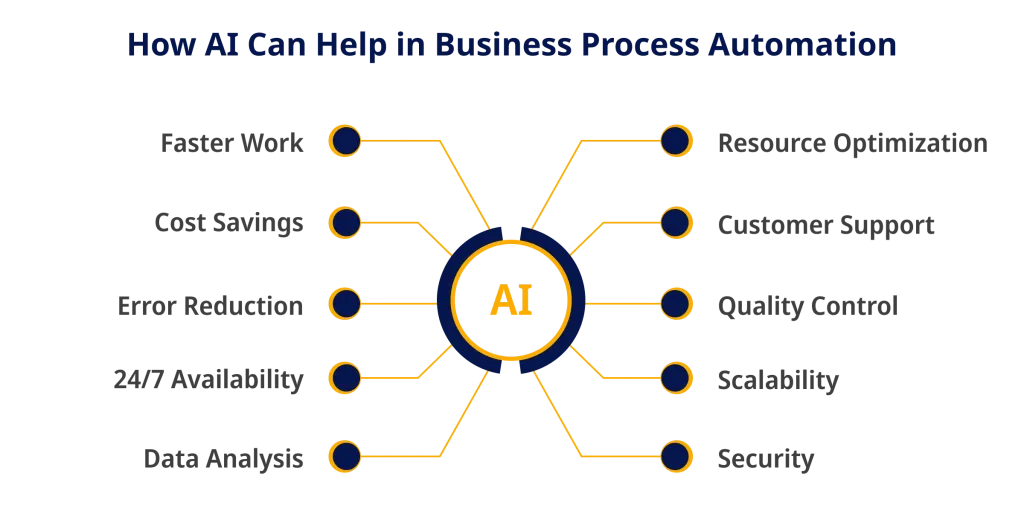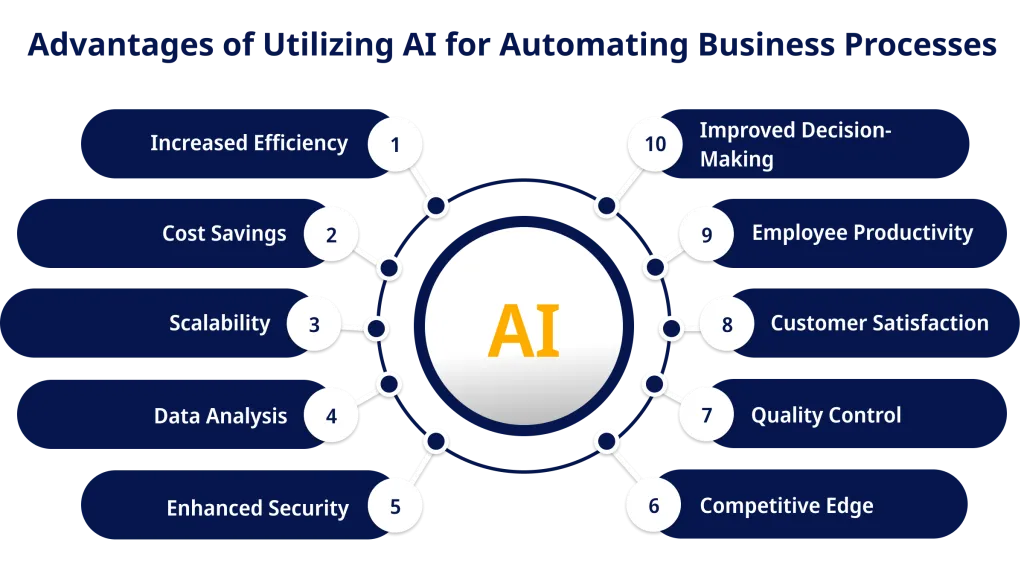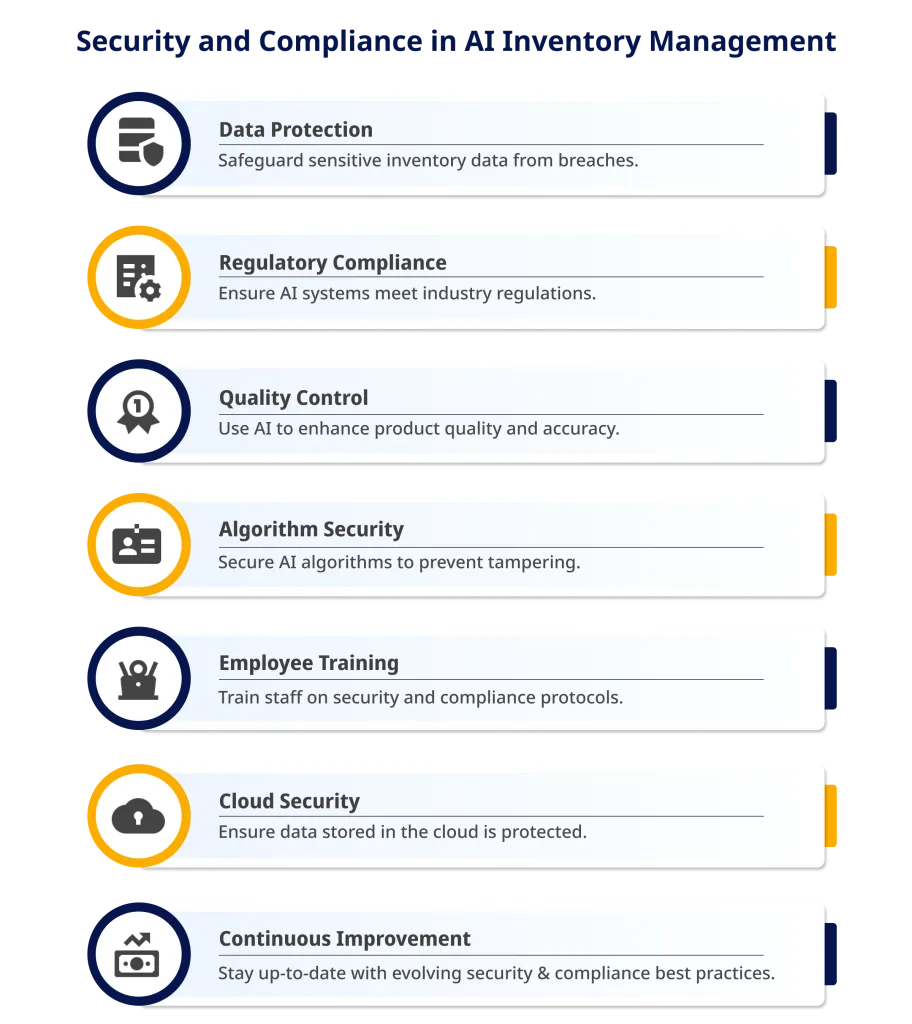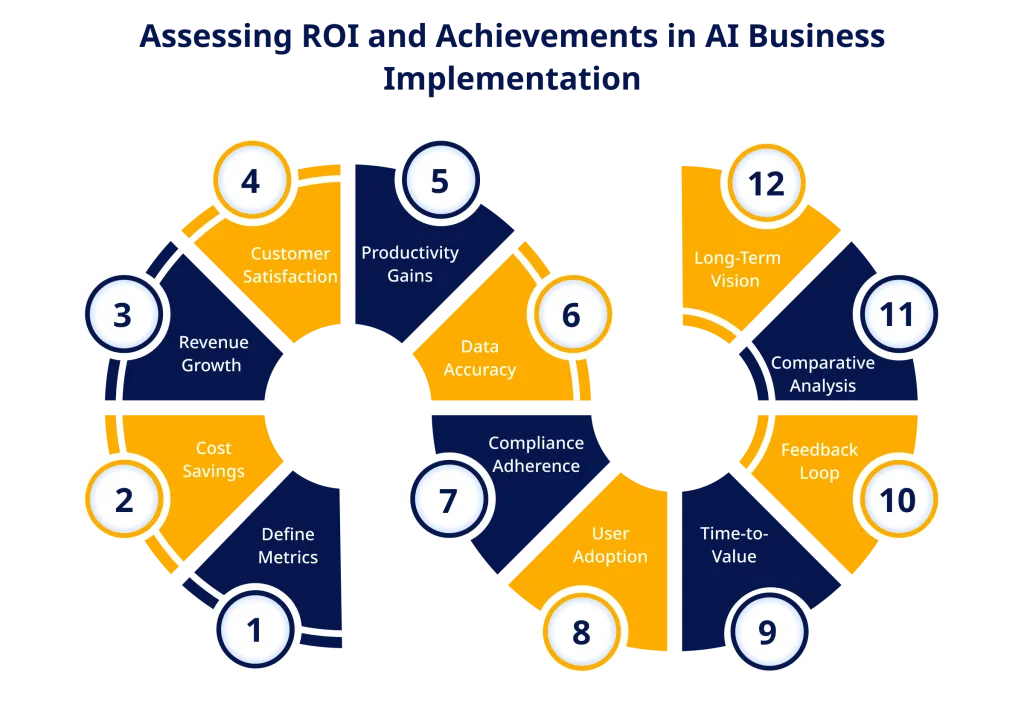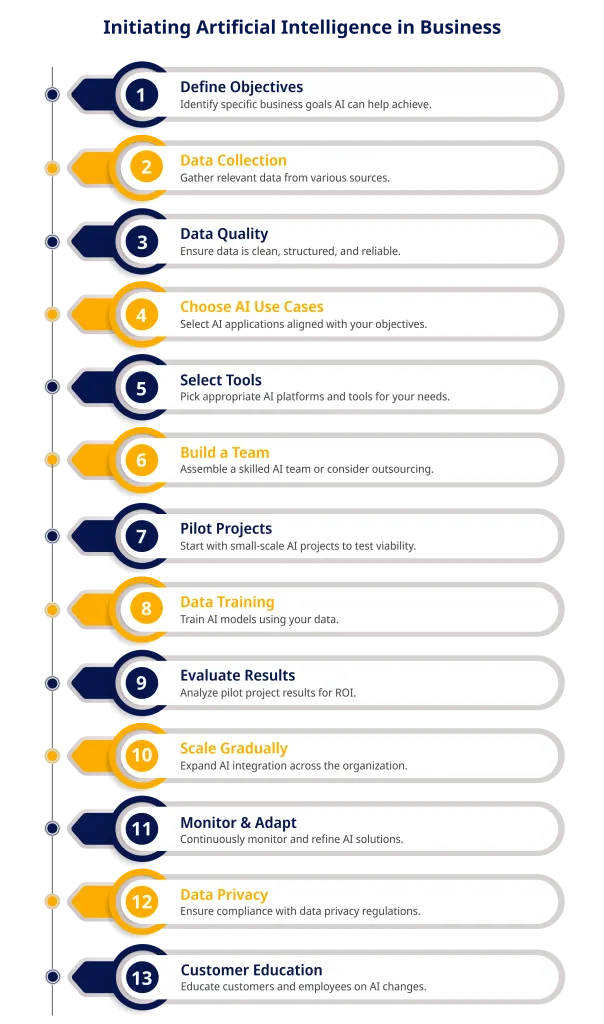Did you know AI could increase business productivity by up to 30% while lowering operational costs by 20-40%?
These game-changing stats by McKinsey are worth noticing, yet many organizations are leaving these AI benefits on the table by underutilizing automation.
AI has immense potential to reinvent processes, and businesses should take advantage of this opportunity to thrive!
The big question arises here: is your business ready to seize this opportunity?
If you are confused and unsure how AI can fit into your business, we are here to guide you.
In this post, you’ll discover how AI can streamline your business tasks, boost decision-making, and even help you save money.
By the end of this blog, you’ll be ready to implement the AI revolution and leverage its full potential to boost your business.
Get ready to change the game with AI
Understanding AI in Business Process Automation
Staying competitive often means adopting innovative solutions like AI in inventory management and other business processes.
But what exactly is AI in business process automation, and how can it transform how you manage your inventory?
Let’s break it down:
Artificial Intelligence (AI) is to the ability of machines to mimic human intelligence. In business, it’s harnessed to automate tasks and make data-driven decisions.
Inventory Management Application
AI in inventory management involves using this technology to optimize how you handle, track, and control your inventory. Here’s how:
- Demand Forecasting: AI analyzes historical data to predict future demand accurately. Say goodbye to overstocked or understocked shelves.
- Efficient Resource Allocation: AI ensures you allocate resources like storage space and personnel more effectively, reducing waste and costs.
- Real-time Updates: With AI, you can keep track of your inventory in real-time, minimizing human error and theft.
Supplier Relations: AI can help you manage relationships with suppliers, ensuring you get the best deals and keep your inventory costs in check.
Incorporating AI into your inventory management allows you to streamline processes and gain a competitive edge.
It’s all about making your business more efficient, responsive, and adaptable to changing market demands.
Propel your business towards success with our comprehensive AI services.
Benefits of AI-Driven Business Process Automation
When it comes to improving your business, AI-driven business process automation can be a game-changer. According to the automation trends shaping 2025, 30% of enterprises will automate over half their network activities by 2026, and nearly 90% of large companies will list hyperautomation as a strategic priority. This shift highlights how automation is no longer optional — it’s becoming central to scaling operations and maintaining competitiveness.
Some of the key benefits of AI include:
- Increased Efficiency: AI streamlines repetitive tasks, ensuring they’re done faster and with fewer errors. In inventory management and supply chain automation solutions, it optimizes order processing, reducing lead times.
- Cost Reduction: Automating tasks means fewer labor hours and lower operational costs. AI helps in inventory management by reducing excess stock and minimizing storage costs.
- Enhanced Decision-Making: AI analyzes vast amounts of data, providing insights humans might overlook. Supply chain automation helps in real-time decision-making by considering multiple factors like demand, transportation, and supplier performance.
- Scalability and Consistency: As your business grows, AI scales effortlessly without compromising quality. For inventory management, it ensures a consistent approach to managing inventory levels across multiple locations.
- Improved Supplier Relationships: AI can assess supplier performance and suggest the best suppliers based on historical data, leading to cost savings and better relationships within the supply chain.
- Inventory Accuracy: AI ensures precise tracking and reduces the chances of discrepancies between actual inventory and what’s recorded in the system. This accuracy is crucial for inventory management, preventing stockouts and overstock situations.
- Streamlined Workflows: AI can design efficient workflows that minimize bottlenecks and delays. For supply chain automation, this means smoother coordination of tasks from order placement to delivery.
- Adaptability to Market Changes: AI quickly adapts to changing market dynamics, allowing businesses to respond to fluctuations in demand, supplier availability, or market trends. In inventory management, this adaptability ensures that your stock aligns with customer needs and market shifts.
- Enhanced Customer Experience: AI can predict customer demands more accurately, reducing lead times and ensuring products are available when customers need them.
- Competitive Advantage: Your business gains a competitive edge by leveraging AI in inventory management and supply chain automation.
Get insights and consultation on integrating AI solutions with experts
Practical Applications
Let’s explore how AI in inventory management and supply chain management solutions isn’t just a concept but a real game-changer in today’s business world:
1. Demand Forecasting: AI crunches numbers to predict customer demand with remarkable accuracy. It analyzes:
- Historical data
- Market trends
- External factors like weather and events
The result? Your business can stock the right amount of inventory, reducing waste from overstocking and missed opportunities due to understocking.
2. Resource Allocation: AI optimizes resource allocation across your business. This includes space, personnel, and transportation. Understanding your needs ensures you’re using resources more efficiently, saving time and money.
3. Real-time Updates: With AI, you’re always in the loop about your inventory. Real-time tracking means you’re always aware of what’s in stock, moving, and needing attention.
This real-time data is essential for inventory management and supply chain solutions, allowing you to react swiftly to changes in demand or disruptions in the supply chain.
4. Supplier Relations: AI doesn’t just manage your stock; it can also help you manage your supplier relationships. Based on historical data, it assesses supplier performance and can even recommend the best suppliers. This contributes to cost savings and a smoother supply chain.
5. Automation of Routine Tasks: AI handles repetitive tasks, such as order processing, invoice verification, and data entry. It frees up your workforce to focus on more strategic tasks. For supply chain management solutions, this leads to smoother operations and better customer service. For instance, integrating powerful tools like an AI-powered electrical contractor invoicing tool can significantly boost business efficiency.These tools simplify estimating and billing processes, enabling professionals to get accurate cost projections and ensure timely payments. Such advanced solutions exemplify the transformative potential of AI in streamlining complex workflows.
AI in inventory and supply chain management solutions is like having a dedicated, data-savvy partner. It takes care of the details, allowing you to focus on growing your business.
To find the right AI model for your business app, read our detailed blog post on AI App-Titude: How To Find Your App’s Perfect AI Model.
Implementation Challenges & Solutions
Implementing AI in inventory management and AI development solutions can be incredibly beneficial, but it comes with challenges.
Let’s find out how to overcome these challenges:
- Knowledge and Training: One of the primary challenges is ensuring that your team understands how AI works and how it can be applied effectively. Provide training to bridge this knowledge gap.
- Data Quality: AI thrives on data. Ensuring your data is accurate, clean, and well-structured is essential. Invest in data quality management tools and practices.
- Cost Concerns: The initial investment in AI development solutions can be intimidating. Create a detailed cost-benefit analysis to justify the expense.
- Resistance to Change: Some employees may hesitate to embrace AI, fearing job displacement or a shift in their roles. Communication and change management are crucial to address this issue.
- Integration Complexity: Integrating AI into existing systems can be complex. Consult with experts and choose solutions that are compatible with your current infrastructure.
- Regulatory Compliance: In some industries, regulatory compliance can be a major hurdle. Ensure your AI implementations align with industry-specific regulations.
- Measuring ROI: Quantifying the return on investment can be challenging. Define clear metrics and benchmarks for success before implementation.
- Security and Privacy: Protecting data and maintaining privacy are paramount. Invest in robust security measures and ensure compliance with data protection laws.
Conquering these challenges is a pivotal step in reaping the rewards of AI in inventory management and AI development solutions.
AI can significantly enhance your business’s efficiency and competitiveness when done right.
Learn more about the transformative power of AI in your business processes.
Enhancing Security and Ensuring Compliance: Key Factors to Consider
Security and compliance are paramount when implementing AI in inventory management or partnering with a data analytics services company.
Here’s how to enhance security and ensure compliance:
- Data Protection: Safeguarding your data is non-negotiable. AI relies on significant data, which must be protected from unauthorized access, theft, or breaches.
- Privacy Regulations: Stay compliant with privacy laws such as GDPR or HIPAA, depending on your industry and location. Understand the data you collect and how it is used.
- Data Encryption: Encrypt sensitive data to protect it during transmission and storage to add an extra layer of security.
- Access Control: Implement strict access controls to ensure only authorized personnel can access data and AI systems.
- Regular Audits: Conduct periodic security audits to identify and address vulnerabilities promptly.
- Transparency and Explain Ability: Ensure your AI systems are transparent and can explain their decision-making processes. This is crucial for regulatory compliance and user trust.
- Vendor Compliance: If partnering with a data analytics services company, ensure they comply with the necessary regulations and security standards. Ask for documentation to confirm their adherence.
- Data Retention Policies: Develop clear data retention policies to determine how long data is stored and when it is deleted. This aligns with compliance and reduces risks.
By diligently addressing security and compliance concerns, you can harness the power of AI in inventory management and data analytics.
It’s a delicate balance between innovation and responsibility; getting it right is crucial for long-term success.
Measuring ROI and Success
Measuring the return on investment (ROI) and success of AI in inventory management or AI development services is essential for understanding the impact on your business.
Here’s how you can measure its effectiveness:
- Define Clear Objectives: Before implementing AI, establish specific goals, such as cost reduction, efficiency improvement, or revenue growth.
- Metrics and Key Performance Indicators (KPIs): Identify measurable KPIs that directly align with your objectives. Common KPIs include cost savings, revenue increase, or operational efficiency.
- Baseline Data: Gather data on your business’s performance before AI implementation to serve as a baseline for comparison.
- Ongoing Tracking: Continuously monitor your chosen KPIs and compare them to your baseline data. Regular tracking ensures you stay on top of progress.
- Cost-Benefit Analysis: Evaluate the costs associated with AI implementation versus the benefits gained. This helps you calculate the ROI.
- User Feedback: Seek feedback from employees and customers. Their insights can provide valuable qualitative data on AI’s impact.
- Adapt and Optimize: If you’re not meeting your goals, be ready to adapt and optimize your AI strategy. Flexibility is key to maximizing ROI.
- Long-Term Assessment: Consider the long-term impact of AI. Some benefits may take time to materialize fully. Measuring the ROI and success of AI is a dynamic process.
It’s not just about working with figures but understanding how AI affects your business strategy and goals.
With clear objectives, the right metrics, and a commitment to adapt and optimize, you can ensure that AI positively impacts your inventory management or AI development services
Steps to Get Started Artificial Intelligence in Business
Getting started with AI in inventory management or machine learning development may seem complex, but it’s manageable when broken down into clear steps.
Let’s simplify the process:
- Define Your Objective : Start by identifying what you want to achieve with AI. Is it better inventory control or more efficient machine learning models? Clear objectives guide your AI journey.
- Assess Your Data : Take a close look at your existing data. Is it clean, relevant, and structured? Ensure that your data is suitable for AI applications.
- Choose the Right Tools : Research and select AI tools or platforms that match your needs. You might consider specialized inventory management software with AI capabilities for inventory management.
- Plan and Budget : Develop a project plan and budget. Include costs for AI implementation, training, and any necessary hardware or software upgrades.
- Pilot Projects : Begin with small-scale pilot projects. Test AI solutions on a limited scale to assess their performance and adjust as needed.
- Data Collection and Training : Gather and prepare your data for AI. Train your AI models with the data to ensure they learn and make informed decisions.
- Integration and Scaling : Gradually integrate AI into your processes and systems. As you gain confidence and see results, scale up your AI initiatives.
- Continuous Learning : AI is ever-evolving. Keep learning, adapt to new technologies, and stay updated on the latest advancements in AI for inventory management or machine learning.
Starting your AI journey involves careful planning, clear objectives, and gradual implementation.
Remember, the key to success is starting small, learning, and adapting as you move forward.
By taking these steps, you can leverage the power of AI in inventory management or machine learning development to drive efficiency and growth in your organization.
Take the first step toward leveraging AI solutions for your business.
Future Trends & Predictions
The future of AI in inventory management, or artificial intelligence in inventory management, promises exciting developments that will reshape how businesses operate.
Here are some key trends and predictions to keep an eye on:
- Enhanced Predictive Analytics: AI will become even more proficient at forecasting demand, enabling businesses to accurately anticipate market trends and customer needs.
- Autonomous Inventory Systems: We’ll see the emergence of AI-powered systems that can manage inventory autonomously, optimizing restocking and order processing in real time.
- Increased Integration: AI will integrate seamlessly with various business systems and supply chain platforms, creating a more interconnected and efficient ecosystem.
- Sustainability and Green Logistics: AI will aid in developing eco-friendly inventory strategies, reduce waste, and lower logistics operations’ carbon footprint.
- Personalized Customer Experiences: AI will enable businesses to personalize inventory for individual customers, leading to improved customer satisfaction and loyalty.
- Supply Chain Resilience: AI will play a vital role in building resilient supply chains, helping businesses adapt quickly to disruptions and market changes.
- AI Ethics and Regulations: As AI’s influence grows, there will be increased attention to AI ethics and regulations to ensure responsible and fair AI use.
- AI as a Standard: AI in inventory management will become the standard rather than an exception, making it an indispensable tool for businesses of all sizes.
These trends reflect the transformative potential of AI in inventory management.
One of our blog posts on The Future Of Automation: 6 RPA Tools Dominating 2023 And Beyond discusses these trends in detail.
As technology continues to evolve, staying informed and adaptable is the key to harnessing the full power of AI for inventory management.
Conclusion
AI-driven business process automation represents a massive opportunity for competitive advantage.
By infusing operations with predictive analytics, intelligent decisions, and hyper-automation, companies can achieve levels of speed, quality, and efficiency previously unimaginable.
But realizing this requires embracing AI-enabled software, rethinking processes with fresh eyes, and fostering an automation-first culture.
With the support of a leading IT company like ValueCoders, you can implement AI solutions successfully.
Although change management presents challenges, the long-term rewards will be truly game-changing.
This new era of automation will mean rethinking roles, from frontline workers leveraging cobots to knowledge workers training AI systems.
But ultimately, humans remain at the center of driving innovation.
The future shaped by AI process automation has immense potential. But unlocking that potential starts with the willingness to transform.
Companies that lead this shift today will propel their industries tomorrow. The time to start this exciting AI journey is now!


